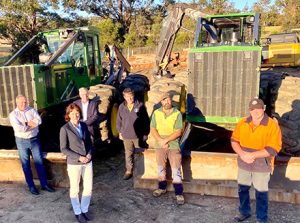The Australian Forest Products Association (AFPA) has called on the Victorian Minister for Agriculture Jaclyn Symes to withdraw her comment in State Parliament that “COVID-19 has led to a drop in demand for native timber products”. Source: Timberbiz
The Chief Executive Officer of AFPA Ross Hampton said the Victorian State Government had chosen to close down a sustainable, job creating industry for ideological reasons.
“It has the right to do this, but Victorians also have the right to oppose it and seek its reversal,” Mr Hampton said.
“What the Andrews Government must not do is use misinformation, like claiming a drop in demand, to justify its decision.”
“It is a decision that is bad for the environment, as it will likely increase deforestation in those countries which do not manage forests sustainably like Victoria. It is also bad for regional communities and outer metro timber working jobs,’’ Mr Hampton said.
“It’s bad for bushfire mitigation, as thousands of men women and firefighting machines will leave the bush and regional country towns.”
Ms Symes made the comment is reply to a question in State Parliament from Eastern Victorian MLC Melina over why she would not meet with seven struggling east Gippsland timber haulage and harvest operators regarding the state of the timber industry.
Ms Symes attributed COVID-19 and bushfires to the industry’s dire situation.
“Obviously, it is no secret that this is an industry that has been hit hard along with many other industries in recent months, having suffered significant losses in the contexts of bushfires and COVID,” Ms Symes told the House.
“Obviously, COVID has led to a drop in demand for native timber products, while the bushfires had a devastating impact on supply … we are still assessing the impacts of the summer’s fires on ash and mixed species volumes, and this assessment will take some time.
“There is impact on the business; I am not denying that.
“Those businesses that have been impacted are being paid stand-down rates and are in a no worse off position financially due to those payments, and the additional work that has been provided to direct them to other types of work, as I have said, mostly in connection with the bushfire response,” Ms Symes said.
“We are certainly also looking at further work in relation to the management of forest tracks and breaks needed to manage the forest into the future.
“These are people that we are continually having conversations with, along with timber mills, as we work through the devastation of the bushfires to ensure that these industries can get on with their businesses.”
Ms Symes added she had met with the Committee for Gippsland and several representatives of the timber industry, including the representative of the contractors for haulage and harvesting.
But Mr Hampton says Ms Symes is wrong.
“The facts are that timber demand has never been stronger and, as the world moves away from plastics and carbon intensive building products, that demand is only forecast to grow,’’ he said.
“The hardwoods from Victorian forests, which are used at the rate of four trees in every 10,000 (and each trees used is replaced through reseeding and regeneration) are sought by architects and home builders for appearance grade timbers, like the panelling which graces the whole interior of the Victorian parliamentary annex.’’
Mr Hampton said that plantation timber did not produce these timbers in Victoria.
“Reversing the native forestry closure decision is the right thing to do when every Victorian job matters,” Mr Hampton said.








